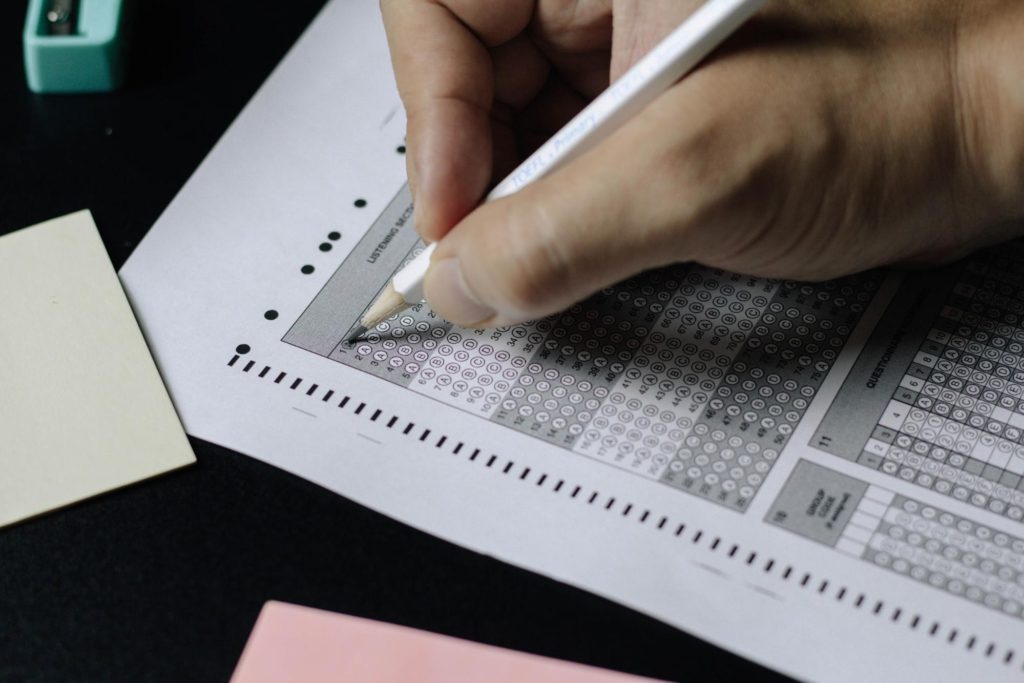UPDATE: This article was originally posted on March 10, 2021. It has been updated with new information and tips below.
Are you just getting started on your MBA application? Chances are, you are feeling a bit overwhelmed. This is completely normal — applying for an MBA is a particularly long and complex process that involves scheduling, brainstorming, writing, and preparing for an interview, all over the course of a year or less! For that reason, it’s important to take the time to plan carefully before you start.
To help you create a successful plan of action that works for you and reduces your stress, we have created the following suggested timeline for completing the MBA application process.
Note: take a look at the different application rounds to determine a schedule that works for you in alignment with the following recommendations.
At least 6 months before deadlines: schedule and prepare for your GMAT and language test
One of the first tasks you must complete as part of the application process is taking your GMAT and language test (if applicable). When scheduling your test(s), take into consideration the amount of time needed to prepare sufficiently.
It is recommended to spend around 100 hours studying for the GMAT, which will take approximately 4-6 months. The amount of time needed to prepare for your language test depends on your level of English, but we recommend starting this at around the same time as your GMAT prep.

4-5 months before deadlines: take your tests, research schools
There are a few reasons why we suggest taking these tests so far in advance. First, it simply takes time for the testing companies to process and score your tests (approximately 3 weeks).
Secondly, you may not be happy with the first score you get, so we suggest leaving time to retake the test to get the score you want. (In fact, doing so is recommended; the average test taker increases their score by over 30 points on a second attempt!)

During this time period, you will also want to do proper research on the school(s) you are applying to ensure a good fit and prepare to write about why you are choosing your particular program(s). This will include looking around the school and program’s website, connecting with alumni, reading about clubs and other extracurricular activities, and looking up faculty whose work aligns with your own.
If possible, it can also be helpful to you and your application to make a school visit before you apply. This will allow you to interact with students and professors, attend some classes, and get a feel for the school’s atmosphere. However, applicants are often too busy or unable to travel, so keep in mind that this step is not necessary.
NOTE: Due to COVID-19, campus visits may still not be 100% available. If you are not able to visit the schools this year, you can still reach out to current students and alumni, as well as attending official webinars the schools hold.
At least 4 months before deadlines: start brainstorming your essays

You want to give yourself enough time to think about your outline for your written responses – consider that there is a lot of self-reflection and organizing involved in this part of the process. It’s important to spend time brainstorming what you want to highlight about yourself and your career, goals, strengths, impact, and skill/knowledge gaps. You will also want to spend time reflecting on how your values and drives match with the program(s) you are applying to – for example, what kind of communities do you thrive in, how will you grow from this at the particular school(s) you’ve chosen, and what difference will this make in your future career? Figuring out answers to these questions before you start writing will help you form solid arguments and provide clear reasoning for your choice of program/school.
Be sure to organize your ideas carefully and strategically based on what each school is asking for in their questions specifically and what they value in admitted students in general. Having all of this information laid out in outlines will help you make sure you are covering all of your bases and not overlapping stories.
Consider that you will be throwing ideas away and integrating new ones as you go through this stage of the process, so leaving yourself enough time to experiment and adapt is essential!
At least 3 months before deadlines: start writing your essays
Now it’s time to put all of your ideas into prose. At this stage, focus on structure and establishing your foundations first (you can add in additional elements like hooks and powerful conclusion sentences later). Building stories on clear main ideas is key to selling an engaging and memorable essay!

Your essay writing sessions should be structured based on how you prefer to write, whether that’s in short bursts or long sittings. However you choose to write, make sure you leave lots of time for reflection, walking away, and coming back to your work. Ask friends, family, or professionals to read and comment on your work. A couple of weeks of this should be incorporated into your timeline even after the essays are “finished.” This practice gives you fresh eyes to see your own work and tweak as necessary.
At least 1-2 months before deadlines: contact your referees and request degree transcripts
You want to make sure to give your referees enough time to write you a reference. Often, candidates do not leave sufficient time for this, forgetting that their MBA application is a priority for them but not always for others. To ensure your referees are able to give you quality — rather than rushed — content, it is important to leave them plenty of time to fit this into their schedules. We recommend that you choose referees who have supervised you in the past and know your work ethic well.
If you work in an over-represented pool, like management consulting, you may want to consider contacting your referees as soon as you have decided upon the best recommenders for your application. That’s because many people often ask for letters of recommendation from the same people in your company and most recommenders choose to limit themselves to recommending 1-2 people per year.
You also want to request your degree transcript at this time, as it may take a few weeks for the school to send this out.
2-3 weeks before deadlines: submit your application
We strongly encourage you to submit your application early – we have heard too many unfortunate stories of months of work going down the drain because of a technical issue or a last-minute document that an applicant forgot to prepare. Submitting your application two to three weeks in advance will give you time to troubleshoot any potential issues.
Additionally, allowing enough time to fill out the application will allow you the time to carefully answer each additional question on the form in a manner that ensures your responses are aligned with your personal brand.
Post-application: the interview
After you’ve submitted your application, your next hope is to receive an interview invitation from the program, which you should expect around one month after submission. Your interview will then take place within just a couple of weeks, and you will receive notification of the school’s final decision around one month after your interview.
On average, only 50% of applicants who are invited to interview are offered admission, so if you’ve made it this far, you’re not out of the water yet! Even though you only have a few weeks to prepare for your interview, you must do so diligently, just as you have done for the rest of your application, as most b-schools consider the interview a critical criterion for admission.

Luckily, all the brainstorming and writing you did about yourself, your experience, how you fit with the school, and your future achievements is excellent prep for showcasing your strengths and passions during the interview.
We suggest that you start preparing for your interview soon after you submit your application, as taking a few weeks off is sacrificing vital time that you can use to do more research, develop your responses, and practice.
For more details on the application, interview, and program preparation, see our page on Everything You Need to Know About the MBA Process.
Seek help in planning and executing a successful MBA application
Making sure you are not only preparing all the necessary elements of an MBA application but also crafting them for successful admission is a difficult task to achieve on your own, especially when you are juggling work and other projects at the same time.
This is why Ellin Lolis Consulting’s expert team is here to help you. We can help you at every stage of the application process, from organizing tasks and personal deadlines to crafting outstanding essay responses to nailing your interview. Apply to work with us today!
Real MBA Essays That Got People In
School-specific sample essays that got our clients accepted






